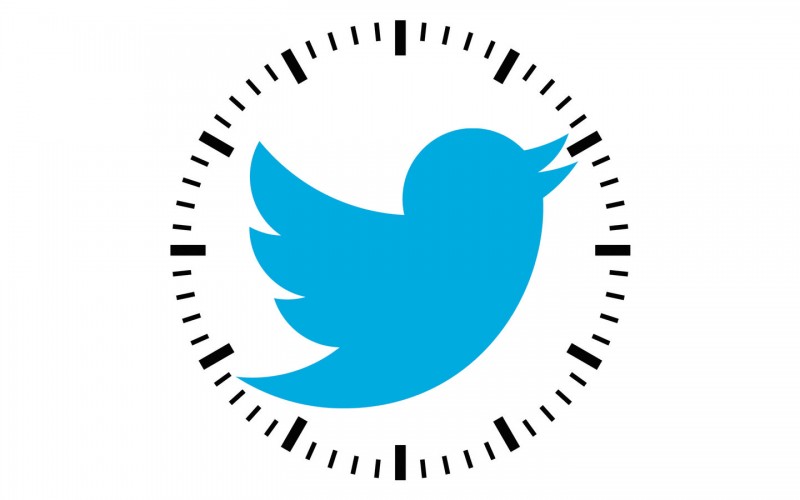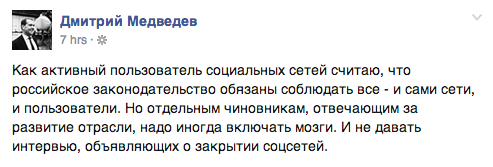
Time may be up for Twitter's independence in Russia? Images mixed by author.
The deputy director of Russia’s chief censorship agency, Roscomnadzor, has threatened that the government could block Twitter or Facebook entirely, in a matter of minutes. Maxim Ksenzov told Izvestia newspaper that Twitter is a “global instrument for promoting political information,” implying that it serves American geopolitical interests that endanger Russia. Twitter currently has over 200 million users worldwide, with more than 1 million in Russia. Facebook has over 1.3 billion users today, with 21.4 million in Russia.
Hours after Ksenzov’s comments were published, Russian Prime Minister Dmitri Medvedev lashed out, writing on Facebook that state officials “sometimes need to turn on their brains” instead of “announcing in interviews the shutdown of social networks.” Medvedev’s post attracted more than 5 thousand “likes.” Shortly thereafter, Roscomnadzor reversed a previous statement and clarified that Ksenzov’s comments reflect only his personal opinion, rather than the agency’s official position. Vladimir Putin’s press secretary, Dmitri Peskov, later told Izvestia that “persecuting mass media or social networks is unacceptable,” but reiterated the need for foreign websites to obey Russian laws.

Dmitri Medvedev lashes out at state officials who make announcements about closing whole social networks. May 16, 2014, Facebook.
Following the scandal surrounding the interview, Vadim Dengin, a Duma deputy who chairs a committee on information regulations, tried to finesse Ksenzov’s comments, saying that he wasn’t threatening to close down Twitter so much as signaling the need for the website to establish legal representation in Russia. Currently, Twitter has no employees or infrastructure in Russia, making it difficult for the government to make demands of the company. Ksenzov stressed this point in his interview, explaining that Google is the most cooperative of US Internet giants, followed by the sometimes-compliant Facebook. Twitter, on the other hand, “categorically refuses to delete illegal information in most cases,” Ksenzov complained.
TJournal’s Nikita Likhachev pooh-pooed Medvedev’s public criticism Ksenzov, arguing that the Prime Minister has no qualms about Internet censorship, and was merely giving the state official a slap on the wrist for discussing it publicly in an interview. According to Likhachev, many Russian Internet users wrongly interpreted Medvedev’s response as a challenge to Roscomnadzor.
Could it be that the country’s former president-blogger wouldn’t mind a Russia without the world’s most popular social networks? What are the nation’s industry leaders saying?
Tech website Hopes & Fears spoke to seven influential Russian Internet entrepreneurs about the possibility of losing access to Twitter and Facebook. Of the group, only Aleksandr Vinokurov, owner of several anti-Kremlin news portals (including the beleaguered TV Rain), seems to be genuinely worried that the RuNet would suffer without American social networks. According to LiveInternet’s German Klimenko, banning foreign services could even be a boon to Russian websites. Other industry figures say that most of their traffic still comes from Russian services like social networks Vkontakte and Odnoklassniki. Habrahabr’s Denis Kriuchkov, meanwhile, is confident that Facebook and Twitter will reach some kind of arrangement with the government, agreeing to censor quietly, in order to maintain access to the Russian market.
Medvedev’s Facebook post, Roscomnadzor’s clarification, and Peskov’s mitigating comments all suggest that Russia is, in fact, not poised to shut off access to Twitter or Facebook. Not in a matter of minutes, anyway. American social networks can still expect a grace period in Russia, during which the Kremlin will wait for web companies to establish local offices and open lines of communication with state censors. Under this logic, Twitter and Facebook will comply, if they value their business in Russia.
In sum, the Kremlin is betting that profits will prevail over principles when it comes to the Russian Internet.



